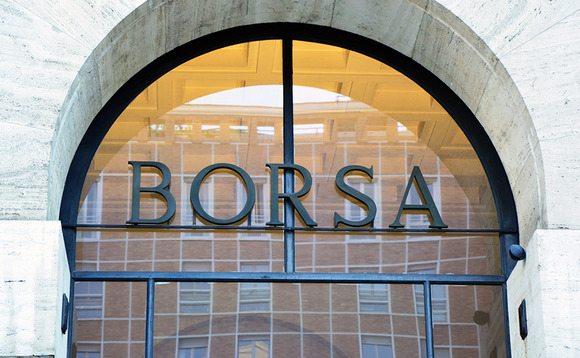
SPACs offer flotation alternative for Italian GPs

Global geopolitical turbulence and volatile public markets have curbed stakeholders' IPO ambitions, but special purpose acquisition companies are gaining momentum, offering an alternative exit route. Amedeo Goria reports
Earlier this year, Italian buyout house Private Equity Partners (PEP) and investment bank Equita Sim signed a joint venture agreement that saw the launch of a special purpose acquisition company (SPAC) called Equita Pep SPAC (EPS). As it floated on the Aim segment of the Milan stock exchange, the vehicle exceeded its initial €100m target and raised €150m from both domestic and international investors, including asset managers, banks and family offices. Notably, EPS represents the first SPAC promoted by institutional investors, rather than individuals.
Following its IPO, the vehicle has two years to find one or two suitable targets to acquire and position itself to start generating returns via the sale of shares. "EPS targets Italian companies with an agnostic approach," says Fabio Sattin, chairperson and co-founding partner at PEP. Sattin currently manages EPS alongside PEP co-founder and managing director Giovanni Campolo and Equita's head of equity research, Stefano Lustig and head of private equity, Rossano Ruffini.
"Whereas a fund manager could prefer a trade sale, due to the certainty of the ticket, an SPAC enables the vendors to fix the price and, concurrently, allows the entrepreneur to retain control of the business" – Simone Strocchi, Gruppo Electa
"As PEP decided not to launch its fifth fund in 2014, we started looking for alternative investment methods within the private equity industry," says Sattin, adding that the firm has invested through several alternative routes since then, including co-investments and club deals. "An SPAC is a more liquid instrument for our investors, but unlike other SPACs, ours is an institutional vehicle that does not [merely] fulfil its purpose in listing the target company, but also aims to create value through active ownership and deliver returns over a longer-term perspective."
The key point that lured PEP to launch this vehicle, says Sattin, is that SPACs "represent a different and quicker process for listing a company on a public market". This "reduces the risk of failure, as the SPAC's promoters fix an adequate price with the company's shareholders prior to the listing process". Indeed, the risk of failure is crucial in a market such as Italy, where failed IPOs represent more than 50% of the initiated processes.
According to unquote" data, there have been 16 private-equity-backed IPOs in Italy between July 2007 and June 2017, representing 4% of Europe's listings. By comparison, Germany, France and the UK have seen 36, 82 and 96 respectively. The emergence of SPACs could prove a more fruitful route to the public market for the country's private equity vendors.
The risk of a failed IPO deters businesses, but also their stakeholders, says Simone Strocchi, founder and managing partner at Gruppo Electa and chairperson of AISPAC, the Italian SPAC association. He explains that combining with a listed SPAC "offers an automatic listing on a public market, bypassing the traditional procedure and the uncertainty linked to the price-fixing process".
Realigning interests
However, Strocchi adds, "This is not the only factor that attracts private equity fund managers to SPACs, because these vehicles also offer a competitive exit strategy to a portfolio manager looking to deliver returns for its investors." In fact, SPACs can offer a solution to a misalignment in interests between an entrepreneur, who is keen to retain control of their business, and the private equity shareholder, which has fulfilled the lifespan of its investment, explains Strocchi. "Whereas a fund manager could prefer a trade sale, due to the certainty of the ticket, an SPAC enables the vendors to fix the price and, concurrently, allows the entrepreneur to retain control of the business."
This was the case for IPO Challenger, launched by Gruppo Electa partners Strocchi and Angela Oggionni, alongside Digital Magics partner Luca Giacometti. IPO Challenger acquired PEP-backed Giordano Vini and the family-owned business Province Italia in late 2014 and subsequently merged the businesses into a €140m-turnover group called Italian Wine Brands (IWB). In January 2015, IWB combined with IPO Challenger to float on Piazza Affari's Aim segment.
EPS may represent the first private-equity-backed SPAC to list on the public market, but the number of these vehicles is increasing and could attract the interest of other GPs. During September alone, Italy has seen the launch of two more SPACs: Capital for Progress 2, which has a cash pile of €65m, and Spactiv, a vehicle with a €100m target.
Italian boom
While the data pool surrounding the popularity of SPACs in Europe remains relatively small, a look at the US market provides interesting insights. The US is the largest global market for SPACs and was home to the first such vehicle, which was launched in 2003. Since then, the US has seen the registration of 271 SPACs, according to analytics website SPACanalytics.com.
The popularity of SPACs reached a peak in 2007, but, according to law firm Eversheds Sutherland, they became less popular after the financial crisis, with only one $36m vehicle listed in 2009. However, during the past three years, they have gained momentum, with 2015 seeing 19 SPAC listings raising $3.6bn, a 120% increase on the amount raised in 2014.
According to AISPAC, SPACs are now enjoying strong momentum in Europe, and the Italian market is gaining an edge on its neighbours. Since 2011, when Strocchi launched the first SPAC, a €50m vehicle named Made in Italy 1, the country has seen 19 such vehicles, of which 12 have been launched since 2015.
Other Italian SPACs include IPO Club, a pre-IPO vehicle managed by Electa Ventures and Azimut Global Counseling. The fund launched in May 2016 with a €150m target and held its first close on €120m in February 2017. The fund managers aim to acquire 10 Italian SMEs with enterprise values in the €70-300m range and net debt of around 1x EBITDA. Similarly to an SPAC, the fund allows its portfolio companies to avoid the typical listing hurdles, including the information memorandum, pilot fishing and the share price fixing process, given that the investor syndicate negotiates the price with the majority shareholders prior to the IPO.
The fund launched its first SPAC, called IPO Challenger 1, in May 2017, which raised €20m. Electa and Azimut provided 30% of the capital invested, while international investors injected the remaining 70%. Shortly after the launch, IPO Challenger 1 acquired Pisa-based pharmaceutical products manufacturer PharmaNutra. As a consequence, the €33m-turnover business floated on Borsa Italiana in July 2017 and the sponsors of the pre-booking company retained a 24% stake.
A successful listing does not mean a profitable investment will follow. In fact, research by Sutherland reveals 76 SPACs have been forced into liquidation since 2003. These vehicles may be gaining recognition as a valuable tool for fund managers, but they require expertise across private equity and the public markets industries to identify the right investment opportunities and subsequently deliver high returns post-listing.
Latest News
Stonehage Fleming raises USD 130m for largest fund to date, eyes 2024 programme
Sponsor acquired the public software group in July 2017 via the same-year vintage Partners Group Global Value 2017
Stonehage Fleming raises USD 130m for largest fund to date, eyes 2024 programme
Czech Republic-headquartered family office is targeting DACH and CEE region deals
Stonehage Fleming raises USD 130m for largest fund to date, eyes 2024 programme
Ex-Rocket Internet leader Bettina Curtze joins Swiss VC firm as partner and CFO
Stonehage Fleming raises USD 130m for largest fund to date, eyes 2024 programme
Estonia-registered VC could bolster LP base with fresh capital from funds-of-funds or pension funds









